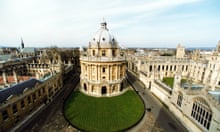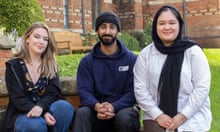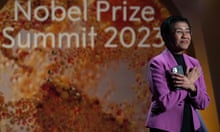Oxford University’s new professor of LGBTQ+ history has accused the government of “fanning a culture war” over freedom of speech, insisting it is alive and well in higher education.
Matt Cook, who was this week named as the first Jonathan Cooper chair of the history of sexualities, a newly created post at Mansfield College, was speaking only days after the appointment of the government’s first “free speech tsar” for higher education.
Cook said the issue had been blown out of proportion and there were only a “tiny fraction” of cases where speakers were cancelled. He pointed to the recent appearance of the gender-critical feminist Dr Kathleen Stock at the Oxford Union, which went ahead despite protests by trans activists.
“I completely stand with the position that the university and the college takes on freedom of speech. And I also stand by the right to the freedom to protest. I think both things are important.”
His comments, in an interview with the Guardian, were made only days after Arif Ahmed, a Cambridge philosophy professor, was named as the government’s new director for freedom of speech and academic freedom for higher education in England.
The role was created by the Higher Education (Freedom of Speech) Act, which received royal assent last month, and will oversee a regime that could impose fines on higher education providers and student unions if they prevent speakers appearing without good reason.
“Free speech and academic freedom are vital to the core purpose of universities and colleges,” Ahmed said. “They are not partisan values. They are also fundamental to our civilisation. As director, I will defend them using all means available.”
Cook, a renowned cultural historian who has written extensively on queer urban life, the Aids crisis and queer domesticity, denied that free speech was under threat in higher education.
“Of course there’s protests about certain people speaking and there has been historically, about figures as diverse as David Icke and Enoch Powell, and that’s right,” he said.
“But these people still spoke in university contexts, despite the protests and despite the calls for people not to speak in university forums. It’s only a tiny fraction of cases where people actually don’t speak.
“So my sense is that it’s not a huge problem. I think the issue has been blown out of proportion. I also think there’s some political expediency in this. It’s a way of fanning a culture war. I don’t think we need additional protections for free speech in the university. Free speech is pretty alive and well.”
Cook will take up his role as the UK’s first fully endowed professor of LGBTQ+ history in October after 18 years at Birkbeck College, University of London. On the trans debate, he said he hoped to bring together scholars and activists to look at it from a historical perspective.
“There’s a way of thinking historically about cycles of fear and phobias. So it’s very striking to me the way in which gay men in the 1950s and also the 1980s were vilified as a threat to children, as treacherous, as deceitful.
“We can see the same kind of recycling of fear at the moment, in very, very similar terms. So I think in a way history can help us think through, what is it about these particular moments of fear and why?
“The trans people I know currently are facing real daily prejudice that’s misogynistic, transphobic. And I think we need to think very seriously about how we allow everybody in this country to have a livable life, and that includes trans people. Part of that is understanding how people have found ways of living their lives in the past.
“I’m very hopeful that the kind of work that we’ll be doing in Oxford, and is going on in other places, in 10-15 years hence, people say, ‘Oh OK, so this is how trans people have lived their lives historically. And this is how they’ve been part of this cultural society.’
“It doesn’t solve the immediate febrile issue, but hopefully it gives some kind of grounding going forward, for thinking through these issues historically.”
Does he feel optimistic or pessimistic about how the culture war will play out in the run-up to the general election? “Thinking historically, the Thatcher government used very cynically the ‘threat of gay men and lesbians to children in schools and public life’ as an electoral move and it helped their re-election.
“The Conservative party know that you can mobilise fear in a way that can win you some votes. Whether it will succeed I don’t know. There’s certainly an attempt to stoke fear about trans people and that will be deployed towards the election unfairly.”
But, he went on: “I do feel hopeful because I think trans people and the LGBT community more broadly is being heard more and at the moment that’s deeply controversial, but in 10 years’ time, the fact those voices have been heard will have had its effect as well.
“The fact that Oxford and Mansfield have put their heft behind this role, and also committed further fundraising and possibly another post in the future, is a real sign that they’re keen to underpin debate and scholarship going forward.”









